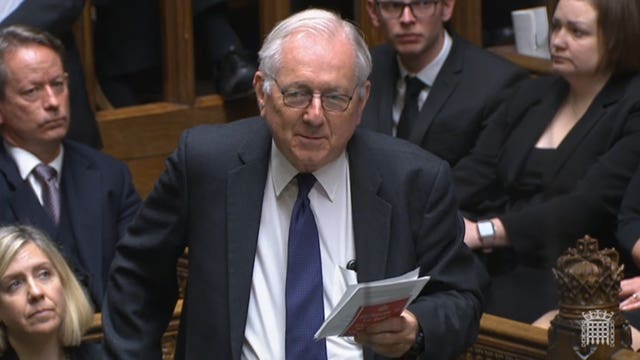The BBC has criticised the Government’s two-year freeze of the licence fee, arguing it will lead to “tougher choices” that will impact on viewers.
Bosses at the corporation branded the move “disappointing” on Monday as Culture Secretary Nadine Dorries even came under criticism from her own side while arguing it was necessary to tackle the rising cost of living.
As she also confirmed a review of the licence fee’s existence in the future, Labour accused the Cabinet minister of trying to distract from Boris Johnson’s woes while waging a “vendetta” against the BBC.
Ms Dorries told the Commons that the BBC had asked for the fee to rise to over £180 by the end of the current settlement but said it will instead be fixed at £159 until April 2024 before rising with inflation for the following four years.
She argued that the freeze was necessary to help households through “difficult times”, telling the Commons: “When it comes to monthly bills, this is one of the few direct levers that we have in our control as a Government.”
BBC chairman Richard Sharp and director-general Tim Davie issued a statement arguing that there are “very good reasons for investing in what the BBC can do”.
“A freeze in the first two years of this settlement means the BBC will now have to absorb inflation,” they said.
“That is disappointing – not just for licence fee payers, but also for the cultural industries who rely on the BBC for the important work they do across the UK.
“The BBC’s income for UK services is already 30% lower in real terms than it was 10 years ago. We will set out the implications of the settlement later, before the end of the financial year, but it will necessitate tougher choices which will impact licence fee payers.”
Statement on the Licence Fee settlement from Richard Sharp, BBC Chairman, and Tim Davie, BBC Director-General. https://t.co/lbi3zCVfEV pic.twitter.com/4K41QALoyy
— BBC Press Office (@bbcpress) January 17, 2022
They said they “look forward to the nation debate” on the next charter, accepting that “all options should be considered”, after Ms Dorries said she wants to find a new funding model after the current deal ends in 2027.
But they added: “The BBC is owned by the public and their voice must always be the loudest when it comes to determining the BBC’s future.”
Labour’s shadow culture secretary Lucy Powell said the Government’s move makes it look like a “tin-pot dictatorship”.
She argued Ms Dorries was using the announcement as a “distraction” from the Prime Minister’s “disintegrating leadership” as he faces calls to resign over allegations of lockdown-breaking parties in Downing Street.
“Is the licence fee really at the heart of the cost-of-living crisis? Or is this really about their long-standing vendetta against the BBC?” Ms Powell said.
Ms Dorries responded: “It is nobody’s intention to destroy the BBC.”
Senior Tory Sir Peter Bottomley said he was “not impressed” by the announcement and questioned why it is the “one thing” that cannot be increased because of the cost of living crisis.

Sir Peter, who as Father of the House is the longest-standing MP, also questioned what the alternative funding models for the BBC are, arguing public broadcasting is preferable to “having everything go to some of the big media people round the world who won’t maintain” the BBC’s values.
Ms Dorries replied: “The decision as to what the future funding model looks like is for discussion, some of us may not even be here by the time 2028 arrives.”
The Culture Secretary had insisted it was a “fair settlement for the BBC”, with the corporation expected to receive around £3.7 billion in licence fee funding in 2022.
But she also attacked the broadcaster, arguing it needs to “address issues around impartiality and group think”.
“So it’s time to begin asking those really serious questions about the long-term funding model of the BBC and whether a mandatory licence fee with criminal penalties for individual households is still appropriate,” she added.
Ms Dorries also dropped hints of potentially decriminalising TV licence non-payment, saying it is “under review”, and questioned whether the “threat of bailiffs or criminal prosecution is just in today’s age”.
And she announced that Welsh language broadcaster S4C will get an additional £7.5 million per year from the licence fee after a five-year funding freeze.
DCMS Committee chairman Julian Knight MP welcomed the Culture Secretary’s decision but said an “alternative source of funding” was needed for the broadcaster.
“I welcome the statement from Secretary of State Nadine Dorries to freeze the cost of the BBC licence fee for two years and the Government’s review of the licence fee model,” he said.
“However, the BBC plays a fundamental role in our culture and demonstrates the richness of this country’s broadcasting landscape.
“In order to preserve this institution for audiences, it is critical that the Government provides clarity on how future funding will be provided, given the current levels of broadband coverage which cast doubt on the success of a subscription model.
“An alternative source of funding must deliver the stability necessary to enable the Corporation to compete effectively on a global stage.”




Comments: Our rules
We want our comments to be a lively and valuable part of our community - a place where readers can debate and engage with the most important local issues. The ability to comment on our stories is a privilege, not a right, however, and that privilege may be withdrawn if it is abused or misused.
Please report any comments that break our rules.
Read the rules hereLast Updated:
Report this comment Cancel